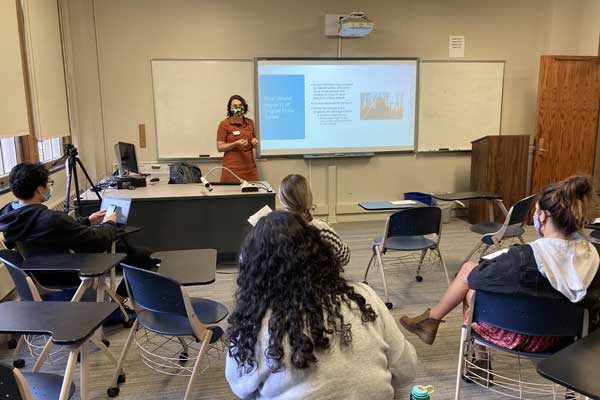Technology, Artificial Intelligence, & Society
Bachelor of Arts
Become a policy maker, tech journalist, lawyer, compliance expert, or advocate.
While other colleges and universities teach coding and technology, this specialized degree applies an ethical lens that future business leaders, policymakers, and other professionals need. You'll be prepared to address the challenges, risks, and workforce needs that technology such as artificial intelligence brings. Learn about the impact of advanced technologies on major social institutions, including work, politics, health care, law, family, and education, as well as the ethical, legal, and political implications of using computers, "big data," and algorithms to help humans make decisions.

Highlights
Advocate for positive change.
Customize your electives to strengthen your expertise in your areas of interest.
Flexibility: Add a minor or study abroad.
Collaborate with peers studying ethical data science and AI in business.



Career Paths
- Policy maker
- Tech journalist
- Technology lawyer
- Compliance expert
- Health care advocate
Example Internships and Field Experiences
Your Center for Life’s Work career coach will work with you to arrange an internship with a company, nonprofit, or government office, where you will apply the skills you’ve learned in the program and gain more skills and insights. Nazareth has connections/partnerships with a range of relevant organizations, including:
- TechRochester
- Data and Society
- Ethical Resolve
- Public Interest Technology University Network
99%
of new Nazareth grads are employed or in grad school within six months of graduation
$1,500
Our SPARK Grant provides $1,500 for you to pursue an internship, research, or study abroad. SPARK details »
IRT
Part of Nazareth's Institute for Responsible Technology (IRT) — committed to promoting a just, equitable technological future.
Key Questions
- Consider race, class, gender/gender identity, sexual orientation, and disability in the use of technology, such as: How can bias be avoided in facial recognition software?
- Understand the impact of advanced technologies on major social institutions, including work, politics, health care, law, family and education, such as: What are the implications of social media algorithms and the proliferation of deep fakes for democracy? How can algorithms be used to improve health diagnostics and care? How does technology shape romantic and parenting decisions and experiences?
- Analyze the ethical, legal, and political implications of using computers, "big data," and algorithms to help humans make decisions, such as: Does using algorithms result in fairer sentencing practices than human judges? What are relevant considerations in privacy, security, and confidentiality for artificial intelligence technologies?
- Address the impact of artificial intelligence technologies on organizations and business models, such as: Do companies have a duty to workers replaced by computer systems? How might corporate social responsibility practices change or remain in companies using artificial intelligence technologies?
- Explore the future of emerging technologies, such as gaming, smart textiles, physical computing, and animal-computer interaction, such as: Do new technologies demand new ways of thinking about ethics and privacy? How can students best prepare for cutting-edge technology careers?
Program Director

Student Spotlight
"What sets Nazareth's TAS program apart is its strong focus on support and growth. You'll be challenged, supported, and encouraged to grow in tech knowledge and in a thoughtful understanding of the world around you. Professors are approachable and offer one-on-one help outside of class. Student teaching assistants are available during class to help reinforce key concepts. This personalized academic support has made a big difference in my learning.
"I had little prior experience with AI or programming. I was introduced to coding, learned how to create a beginner-friendly game, and developed problem-solving skills through debugging exercises. These hands-on projects built technical knowledge while also boosting my confidence in navigating the world of technology. I'm now better at approaching complex questions — not just in tech, but in everyday decision-making."
— Jahvena Brown '26